E4Impact
Introduction
Mario is the founder of E4impact (Entrepreneurship for Impact) a non-profit organization whose aim is to scale the model he developed to provide world-class training for entrepreneurs from developing countries through the ALTIS Graduate School Business and Society of the Catholic university of Milan.
The New Idea
In recognition of its innovative model, the ALTIS program received the AshokaU-Cordes Innovation Award in 2012 and it offers practical education and training to entrepreneurs with a particular focus on those from developing countries in Sub-saharan Africa, India and Latin America. Following the successful development of the ALTIS model, Mario decided to create E4Impact in order to bring the model to other institutions of higher learning across the world, starting with Tangaza College of the Catholic University of East Africa. The training model is offered in partnership with local universities and has a strong orientation towards supporting entrepreneurs whose innovations have the potential to create new jobs in the market.
Mario’s new idea is to partner with local universities in developing countries in order to make the ALTIS innovation more accessible to local entrepreneurs, while simultaneously transforming the local institutions into impact-oriented support platforms that meet the needs of the rapidly changing higher education environment. Although there is a growing consensus on the need for and role of entrepreneurship education to support local entrepreneurs, and the existence of innovative entrepreneurship education programs such as ALTIs, local universities continue to face challenges adapting to the rapidly changing higher education landscape thus failing in their mandate to prepare young people for the formal economy. For Mario, efforts to move the millions of small scale entrepreneurs who dominate the informal sectors in developing countries will not succeed without the critical role that entrepreneurship education plays in this process, and such education is best offered by the institutions of higher learning (universities and colleges). Only then will local entrepreneurs be in a position to compete for opportunities such as investment and funding to enable them to scale their impact and ultimately become sustainable.
The E4Impact initiative is based on Mario’s insight that a dynamic entrepreneurial system is fundamental to sustain the economies of developing countries particularly due to the significant role that entrepreneurs play in the job creation process. In addition, Mario strongly believes that institutions of higher learning have a critical role to play in developing such entrepreneurial systems particularly through training of local entrepreneurs. Unlike primary and secondary education, the higher education space is characterized by significant global competition which means that the brightest people from developing countries often end up going abroad for university education with the majority remaining there for most of their productive life. This phenomenon, also called “brain drain” is directly linked to the global competition for talent at the university level something that Mario experienced when he launched the ALTIS program in Italy. Ultimately, Mario’s goal is to empower local institutions of higher learning so that they can become as competitive as their international counterparts and hence stem the problem of brain drain. Only then will the brightest minds from developing countries choose to stay and come up with social enterprises that address problems such as youth unemployment.
The Problem
Despite the enormous potential in Sub-Saharan Africa the region continues to face significant challenges which together contribute to the problem of mass unemployment and growing inequality. For Mario all these challenges call for the growth of local entrepreneurs who hold the potential to create jobs and move millions of people out of poverty. Unfortunately, majority of local entrepreneurs lack the level of training to enable them tap into the opportunities that are there to support them. This leads to the phenomenon where majority of (young) entrepreneurs end up creating small informal enterprises that, despite their potential, fail to grow beyond the level where they could actually create a large scale impact. The failure of such entrepreneurs then has a negative effect on other aspiring entrepreneurs who feel demotivated and lack inspiration.
Through his own career and life experience, Mario realized that the main stumbling block that local entrepreneurs face is lack of relevant formal training programs that would enable them transform their informal enterprises into full fledge businesses. Such training is often the preserve of a few entrepreneurs who can afford the highly specialized training programs (for example MBAs) that are usually not available locally due to the globally competitive nature of the higher education space. Unlike primary and secondary education, university education remains highly competitive at the global level contributing significantly to the phenomenon of brain drain in which the brightest people from developing countries migrate to the developing world in search of opportunities.
Although universities and other institutions of higher learning have the potential to provide the training and support that entrepreneurs need, most of those in developing countries lack the capacity to do this effectively and at scale, for a variety of reasons. Faculty often lack the training and experience required to utilize applied learning techniques and thus ends up providing theoretical business knowledge with little practical use for small scale entrepreneurs. In addition, universities tend to be generally isolated from the local business community which makes then unattractive to young entrepreneurs who need to be constantly engaged in the field and cannot take time from their businesses to study. Similarly, the cost of university education remains a major hindrance for many who may also lack the stringent qualifications for admission. The high cost, impractical approach and limited access of university education make it irrelevant for the needs of local entrepreneurs forcing many of them to opt out or travel abroad (at least those who can afford it).
Ultimately it is the young people who form the vast majority of the African population that end up paying the price for these failed (lack of) support system in terms of low employment opportunities in the formal sector. In a survey conducted by the Global Agenda, “business” is the stakeholder that will be most affected by Africa’s educational challenges. Similarly, the European Commission infers that entrepreneurship education and training programs have the potential to promote entrepreneurial skills and attitudes which in turn leads to job creation. In a many African countries, small and medium size businesses (SMEs) contribute to less than 30% of the GDP (often less) and 17% of employment while in developing countries these numbers more than double. Globally, three quarters of the 4 milllion increase in global unemployment in 2012 occurred in East and South Asia and Sub-saharan Africa.
Although numerous efforts have been made to facilitate the formalization of small scale enterprises challenges remain at the policy level where it is difficult to demarcate the formal and informal economy. Other interventions fail to cater for the different needs of entrepreneurs especially those with high-growth potential. There are about 111 entrepreneurship training programs in Kenya and 80 in Ghana, most of which focus on primary and secondary education levels with few operating at the university level. For Mario, only those programs that operate at the university level have the ability to attract the most talented young people and offer support to high-growth entrepreneurs which is the gap that he is trying to fill with E4Impact program.
The Strategy
E4impact provides a unique and innovative way of training entrepreneurs with the goal of creating a world-class entrepreneurial ecosystem around the local universities which then support impact oriented enterprises through funding access to credit and other forms of investment. Through partnerships with local universities, E4Impact effectively functions as a platform for knowledge transfer, bringing a successful entrepreneurship training model to developing countries at scale. Rather than set up independent training programs in each of these countries, E4Impact partners with local universities in a 3 year capacity building process so they can eventually run the MBA program on their own with E4Impact offering continuous support, quality control and international connections.
Once a partner university has been identified, the first step involves setting up of the E4Impact Business Model Center which serves the function of coordinating the partnership between the local university and the organization. The center organizes a Business Plan Competition through which local entrepreneurs are vetted to participate in the MBA training. The Center also coordinates the training of local trainers who facilitate the program. In addition, a local entrepreneur –in-residence is hired to work with the student-entrepreneurs throughout the duration of the training. Finally, the center coordinates support for Alumni, particularly those who are looking to scale internationally.
At the ecosystem level, the E4Impact Business Model Center convenes other players in the entrepreneurship ecosystem from impact investors to incubators and organizations that support social entrepreneurs. For example in East Africa, E4Impact is partnering with Ashoka to provide training for Ashoka Fellows who are looking to scale their impact across the region. In addition, the program partners with local incubators and accelerators including the iHub and Growth Africa. In this way, the program strategically intervenes at the individual, institution (university) and ecosystem levels with the aim of empowering all the actors to be more effective in their work.
E4Impact theory of change is based on the vision to empower local entrepreneurs by partnering with universities and other players in the ecosystem to raise the level of competitiveness to international standards. As such the program aims to change the mind-set of the universities’ faculty and administration first so that they can then empower graduates to pursue entrepreneurship as a viable career.
To change the mind-set at the institutional level, E4Impact seeks to bridge the academic and business or entrepreneurship worlds through such strategies as using business plan competitions to recruit students and introducing the role of entrepreneur in residence/business coaches on campuses. For graduate students, E4Impact aims to change the perception that Entrepreneurship is solely a career for those who fail to do well in academia. It remains a reality that majority of those who do well in school end up in employment while many of the entrepreneurs who run small businesses that carry the potential to create new jobs are uneducated ( up to the university level).
Accordingly, Mario launched the pilot for E4Impact in Kenya in 2010, through a partnership with Tangaza College of the Catholic University of East Africa (CUEA). The pilot became a success leading to the launch of 2 new partnerships in Ghana and Sierra Leone. Mario is currently engaged in discussions with local universities in Uganda (Martyrs University), Ivory Coast (Centre de REcherche et d’Action pur la Paix), Nigeria (Obafemi Awolowo University) and Saint Augustine University of Tanzania. This will bring the program to a total of 7 countries in Africa alone, demonstrating the potential that it has to achieve Mario’s vision of a global network of universities that are driving local entrepreneurial ecosystems and thereby amplifying the impact of homegrown entrepreneurs. In addition to Sub-Saharan Africa, Mario is looking to scale E4Impact to India and Latin America and has already engaged the Universidad del Pacifico in Peru and the Marian International Institute of Management in India for potential partnership.
Despite this focus on international scale, Mario is committed to ensuring that the focus on growing local entrepreneurs is not lost which he guarantees through the partnership model with local universities. In addition, the program is designed to be flexible enough to accommodate the different levels of each local university with some requiring more hand-holding than others. Obviously there is a risk in such a scaling model particularly in terms of ensuring that the quality of the intervention is maintained. Consequently, E4Impact has developed a hub and spoke model whereby the Nairobi and Ghana centers act as training hubs for the rest of the continent in order to encourage peer to peer learning. In addition, Mario is planning to develop the E4Impact Academy to provide continuous training for faculty from around the world which will also enable them to continuously adapt the training to suit changing conditions both locally and internationally.
E4Impact measures its success through a number of metrics including: the number of entrepreneurs and university faculty trained, the number of partnerships established, number of jobs created by alumni as well as number of partners engaged at the ecosystem level. So far, the program has trained 130 entrepreneurs while another 105 and currently undertaking the program. In addition, 28 Faculty have been trained and an additional 12 university faculty members. More than 70 organizations in the ecosystem level (incubators and accelerators) have been engaged. There are 3 partnerships in place with an additional 10 planned for the coming year and 15 requests for replication filed. The organization is currently conducting an evaluation to establish the number of businesses started by their alumni as well as the number of jobs they have created and funds raised. In East Africa, 2 of the alumni from the program have become Ashoka Fellows (Joseph Nkandu & MFarm Co-founder).
The Person
Mario was born to an entrepreneurial family in Milan, Italy and attended the University of Milan. While in university he got involved in student movements for social change, supporting other young student leaders in Eastern Europe which was then under Soviet rule. After graduating, he decided to pursue a career in academia rather than remain in the family business. In the 1990s, Mario founded the Institute for Business Values as a center for development of corporate social responsibility in Italy which continues to today. He then continued with his journey in academia becoming a full professor of Strategy at the Catholic University of Sacred Heart Milan.
Always being the entrepreneur, he came up with the idea for ALTIS as a center for the support and development of enterprises, both for profit and non-profit, which then act as a force for positive change in the society. Mario developed the program with three other colleagues growing it until it became self-sustaining. ALTIS now hires 25 full time workers and more than 30 volunteers. In addition, more than 200 lecturers have been trained to deliver the innovative model in campuses across Europe.
In 2005 Mario was tasked with the challenge to establish a program for training African students in Italy who would then become entrepreneurs and leaders back in their home countries. He realized that despite the strict selection criteria for selecting only those students with strong motivations to go back and create an impact in their countries, Mario realized that a majority of the African students remained in Italy where they found jobs and settled. He then decided to create a program that would bring the same innovative education to African countries working with local universities in a capacity building approach that is aimed at raising their level of competitiveness to international standards. This program (E4Impact) was initially piloted with Tangaza College and is now spreading across the world.




